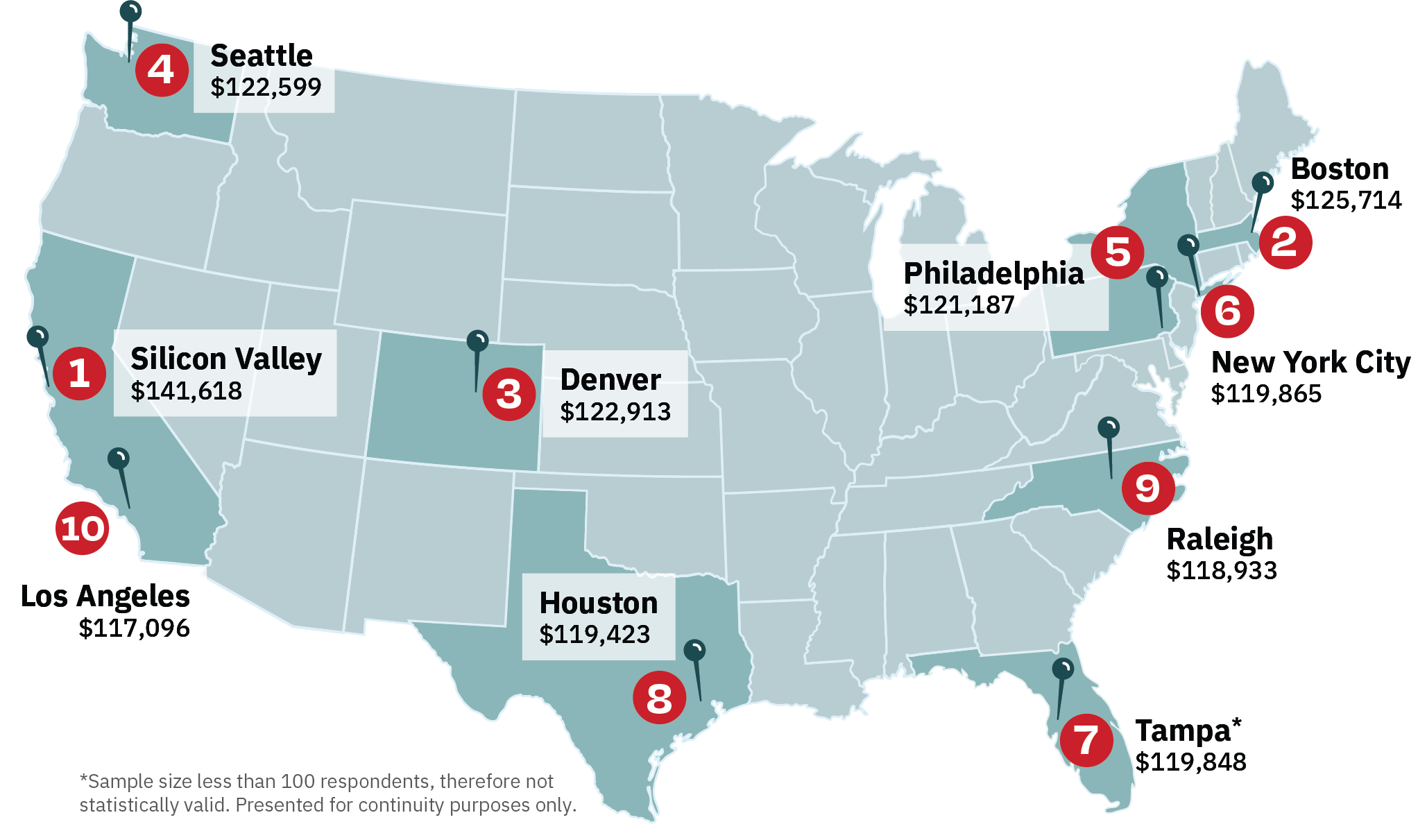Salary Trends
Overview
Tech-salary growth slowed in 2023, dipping slightly to $111,193 (compared to an average salary of $111,348 in 2022). Tech professionals with five or fewer years of experience, along with talent working in major tech hubs such as Silicon Valley, Seattle and Boston felt this salary stagnation the most, while other regions enjoyed an increase in compensation.
Several factors likely play into this. Just two years ago, the tech sector experienced unprecedented salary growth, with the average salary shooting up almost 9% between 2019 and 2021. In 2021, there was also a notable increase in the number of tech jobs, with CompTIA reporting an increase of 260,000 positions. Tech companies everywhere were flush with cash and used those funds to hire and acquire aggressively; some tech giants even hired specialists beyond their needs solely to keep them from being hired by rivals.
However, what goes up must come down. Organizations cut back on their tech spending, forcing tech executives to make hard decisions about headcount. Several notable layoffs took place last year, and 10% of our survey respondents reported being personally affected by layoffs.
According to CompTIA’s analysis, more than 211,000 jobs were eliminated from the tech sector last year, although it’s important to note that loss is still smaller than the number of tech jobs gained in 2021. Following the layoffs in early 2023, we’ve begun to see some of the biggest names in tech (such as Meta and Salesforce) rehiring, suggesting that we’re through the worst of a sharp but brief correction in the tech talent market.
As you dig into the salary data, you will notice notable salary growth in regions like Wisconsin*, Tennessee*, Utah* and Maryland and cities like San Antonio, TX, Philadelphia and Orlando, FL. This aligns with a recognized shift from major tech hubs like Silicon Valley. As workers respond to a higher cost of living by moving to more inexpensive areas, they are finding plenty of opportunities to grow their careers, and the result is more up-and-coming tech hubs across the nation. Industries such as government, aerospace and defense and retail also saw significant tech salary growth, hinting at increased demand for tech professionals outside of the tech industry.
If you’re a tech professional just starting out in your career, you don’t need to move to a well-established tech hub such as Silicon Valley; there’s a good chance a robust tech scene exists right in your backyard. For those on the job hunt, you may want to expand your search to other industries, even ones you don’t necessarily associate with tech. And no matter what your job-hunting strategy is, always keep in mind that a job is more than just a salary: You should always consider a variety of factors, including benefits and company culture — these can produce a great working experience and a satisfying work-life balance.
*Sample size less than 100 respondents, therefore not statistically valid. Presented for continuity purposes only.
2023 Average Tech Salary
Growth Since 2022
Average Salaries in Top Tech Hubs

Tech Hubs
New Jersey, Virginia, Utah* and Maryland all bucked a nationwide flattening in salary growth with notable salary increases. Meanwhile, states hosting well-established tech hubs such as California, Massachusetts and Washington lost some ground in 2023, but because they host some of the richest (and highest-paying) tech giants and startups in the country, they remain comfortably in the top 10.
Massachusetts remains the highest-paying state for tech professionals, though it did lose a bit of ground compared to 2022; the state is home to an incredible variety of tech companies specializing in everything from robotics to fintech, ensuring demand for a broad range of tech skills. Of all states, Wisconsin* salaries grew the most at nearly 17%, although the state’s average tech salary ranked 14th on the list overall.
We saw substantial average salary declines in Arizona and Connecticut*, reversing noticeable growth between 2021 and 2022. The DC* area reported a shocking 14% decline in average salary, but that’s not as concerning when you consider the significant salary growth in neighboring Virginia and Maryland; all three are tightly knit into the same tech ecosystem, with tech professionals frequently living in one state or district and commuting to another.
*Sample size less than 100 respondents, therefore not statistically valid. Presented for continuity purposes only.
Fastest Growing Tech Salaries by State
Growth Since 2022
Average Tech Salary by State — Top 25
Austin* was already home to a vibrant tech community before the pandemic, but things accelerated in 2020, when dozens of companies either established significant new offices or factories in the area. Oracle announced that it would move its headquarters to the state, and companies ranging from Tesla to Apple spun up new facilities. And they brought tech professionals with them, with 29 percent telling anonymous survey site Blind in 2020 that they intended to relocate to Texas.
But that sort of influx has a peculiar side effect: it can boost the local supply of tech talent, depressing compensation as companies have their pick of professionals. That might explain why Austin* saw a 12.8% decline in salary in 2023, given its status as one of the country’s main tech hubs. Charlotte*, Miami and Seattle also lost salary ground last year, although the factors behind those declines might be different.
Meanwhile, San Antonio*, Philadelphia, and Orlando all showed significant salary growth in 2023, hinting at strong demand within those cities for tech professionals.
If you’re considering moving to any of these metro areas (or if you’re already there), don’t take these declines as a sign that your local tech hub is about to implode. It could mean that your tech hub is stabilizing after the influxes and economic roller-coaster of the past few years. These cities will remain tech powerhouses for the foreseeable future.
*Sample size less than 100 respondents, therefore not statistically valid. Presented for continuity purposes only.
Fastest Growing Tech Salaries by City
Growth Since 2022
Average Tech Salary by City
Industry
The aerospace and defense industry was the highest earning for tech professionals in 2023, along with the second-fastest salary growth rate. This isn’t a surprising development considering the $69 billion defense budget; even in the depths of the pandemic, this sector remained a reliable employer of tech talent.
Salaries in industries like government, retail, software and non-profit* also saw significant growth last year, suggesting that tech professionals who want to move beyond the tech industry have their pick when it comes to higher-paying positions across the economy. On the other hand, the average salaries for tech workers in the entertainment industry decreased 5% year over year, a possible reflection of the major writer and actor strikes that effectively stopped projects at many entertainment conglomerates. The recent spate of layoffs at video game companies may have also weighed on compensation.
*Sample size less than 100 respondents, therefore not statistically valid. Presented for continuity purposes only.
Average Tech Salary by Industry

Fastest Growing Tech Salaries by Industry
Growth Since 2021
Salaries Within the Tech Industry and Outside of It
Salaries among tech professionals working at a technology company are 2.9% higher on average than those offered to tech professionals in other industries. As noted before, turbulence in the tech sector has forced many tech professionals to find work in other industries.
We also noticed a considerable difference between salary satisfaction inside and outside the tech industry. Forty-nine percent of tech professionals working for a tech company are satisfied with their compensation, compared to only 34% of satisfied tech professionals not working for a tech company.
*For the purposes of this survey, we defined a technology company as one that includes digital electronics, software, internet-related services, and e-commerce services.
Average Salaries for Tech Professionals Inside the Tech Industry*
Tech Professionals Who Are Satisfied With Their Compensation and Work in the Tech Industry*
Average Salaries for Tech Professionals Outside the Tech Industry*
Tech Professionals Who Are Satisfied With Their Compensation and Work Outside the Tech Industry*
*For the purposes of this survey, we defined a technology company as one that includes digital electronics, software, internet-related services, and e-commerce services.
Occupations
As with past years, the top tech occupations by salary had one big thing in common: they were either leadership positions (CEO, CIO, CTO) or tasked with guiding companies through big projects and digital transformation (solutions architect, principal software engineer*, program analyst). In other words, companies are still willing to pay top dollar to tech professionals who can use their combination of technical and soft skills to guide teams in driving significant change.
At the same time, it’s important to note that the tech professionals tasked with enacting that change on a code level also saw their salaries increase (software developer salaries gained 6.5% in 2023, for example). As the ninth most common tech job posting in 2023, software developers were highly sought after, and the average jump in pay shows it.
DevOps engineers*, product managers, MIS managers* and principal software engineers* lost the most ground. Did compensation for these positions decline in aggregate due to the massive layoffs last year? Or did it dip because more tech professionals are pouring into these roles, boosting the supply? That’s a tough question to answer, but one thing’s for certain: companies will continue to need tech professionals who’ve mastered the arts of project management, DevOps and software engineering.
If you want to boost your salary over the long term, it’s also helpful to adopt management skills. Even if you’re not interested in becoming a CIO or CTO, roles such as solutions architect and principal software engineer often manage huge teams, and knowing how to achieve success in this context is vital.
Systems administrators saw a huge average salary increase (11.2%) last year, followed by software developers and program analysts/managers. Due to the re-emergence of in-office work over the past two years, help desk technicians saw nearly 5% average salary growth, as well; to succeed in the role, these specialists must become skilled at solving problems for remote, hybrid (i.e., in the office a few days per week) and full-time office workers.
*Sample size less than 100 respondents, therefore not statistically valid. Presented for continuity purposes only.
Average Tech Salary by Occupation
Fastest Growing Tech Salaries by Occupation
Growth Since 2022
Skills
In 2023, as in so many past years, data-related skills remained in high demand — resulting in high salaries for tech professionals with a grasp of the languages, tools and abilities necessary to build and iterate data infrastructure at scale. Over the past few years, we have repeatedly seen data-related skills top our estimations of salary and demand, thanks in large part to the increasing sophistication and availability of data and cloud tools that allow any company to harness and analyze its data. From small businesses to large enterprises, there’s a rising awareness that data means the difference between failure and market-beating success.
Last year’s top-paying skill, Service Oriented Architecture (SOA) offers a way for technology teams to reduce development resources, improve agility, and and even increase scalability. Skills such as Docker and Platform-as-a-Service (PAAS) are necessary for building out the next-generation infrastructure that organizations will need for their next digital transformations, including the integration of next-generation technologies such as AI, advanced automation and data analytics.
Some of the fastest-growing skills are clustered in the networking and cloud arenas, emphasizing how organizations will pay a premium for tech professionals who can build out infrastructure. Without reliable databases, networks and cloud platforms, these organizations cannot implement any of the other technologies needed to advance their strategies.
From a tech professional’s perspective, the complexity of many of these skills and tools can lead to heightened opportunities and even a measure of job security. If you’re a specialist who has mastered scalable cloud servers such as Parallels, for instance, you have leverage when it comes to jobs and salary negotiations — provided you keep your skills up to date. Those who can successfully build out data and cloud infrastructure to take advantage of the next generation of AI tools and services will find themselves at an even greater advantage.
*Sample size less than 100 respondents, therefore not statistically valid. Presented for continuity purposes only.
Average Tech Salary by Skill

Fastest Growing Tech Salaries by Skill
Growth Since 2022
Experience
The spike in layoffs and global market uncertainty showed most clearly in our findings related to salaries by years of experience. Considering more than 200,000 tech workers were laid off in 2023, it is unsurprising to see young workers were most impacted by salary reductions; traditionally, new hires (along with highly-paid individuals) are the most susceptible to layoffs.
When looking at the nearly 8% salary decrease of those with three to five years of experience, it is important to remember that this group greatly benefitted from the hiring boom and salary surge of 2021. Hopefully, any tech professionals hired during that surge, only to find themselves out of a job in mid-2023, used that intervening period to boost their skills and certifications. In the meantime, newer tech professionals just entering the market may want to temper their expectations, as many companies aren’t paying the same salaries as a few years ago when their coffers were flush.
We also noticed that those with more than five years of experience saw a notable increase in compensation on average, a fact that supports the notion that years of experience and upskilling still offer substantial value to tech professionals.
Average Tech Salary by Experience in a Tech-Related Field
Hot Skills in Tech
We identified 29 skills out of 332 included in our survey that, if a tech professional has an expertise in, could earn them a $10k+ bump in salary compared to those who self-report using the skill regularly (but are not at an expert level). There are likely a number of reasons for this. For one, a majority of the 29 skills fall within Programming, including skills such as BASH, XAML, C and Java/J2EE to name a few.
Another factor is likely that tech professionals at the beginning of their careers generally earn lower salaries than their more experienced peers, and they are far less likely to cite themselves as an “expert” in any one skill, skewing salary data in favor of those with considerable mastery. In a similar vein, tech professionals who become specialized in difficult-to-learn data and networking skills are rare enough to demand extremely high salaries and generous perks. Bottom line: For tech professionals looking for a competitive edge in a difficult hiring market, upskilling to expert proficiency in their existing skills is a good place to start.
Skills Where Expertise Correlates With Over $10K Salary Increase
Certifications
Some 51% of tech professionals said they had technical certifications, a very slight increase from 2022 (when 49% had certs) and level with 2021 (also 51%). While many tech jobs demand formal certifications, especially in realms such as cybersecurity and networking, the constant demand for tech talent means that many employers are willing to set aside their degree and certification requirements if the candidate can demonstrate they have the necessary skills mastery and experience to actually do the job.
To that point, 45% of tech professionals told us that certifications weren’t needed at this moment in their careers, and 10% didn’t think earning a certification would add value to their role. But let’s not ignore the 11% of tech professionals working on one, along with the 10% who’d earn one if they only had the time, or the 15% who’d want their company to pay for training. For the tech professionals in those latter categories, asking your employer for the time and money to complete certification could really pay off; after all, many managers can see the value in such training.